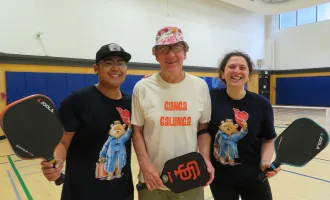
Building a Dream Team
This is the final part of a three-part series on the California Rescue Dog Association.
A dog is only half of the equation in what makes a good search team with the California Rescue Dog Association (CARDA). The handler is just as important. Having the right mindset about the relationship is also essential to making the teamwork.
Out in the field, handlers are no longer there to direct the dog’s every movement. Rather, the handler trusts the dog as a partner who knows what to do with their unique skill set.
The dog may not be perfect, but they are capable of getting the job done, given that they have been trained well.
Cadaver certification comes in different ranks: C1 for large human remains detection source, C2 for small human remains detection source, and C4 for water human remains detection.
It can take up to two years of consistent training for a dog to become fully cadaver-certified, and the qualification test is rigorous.
Behaviors such as alerting on animal remains, eating the source, disturbing it, or urinating on it, will result in immediate disqualification. Once certified, cadaver dogs must then routinely recertify per protocol to maintain active status.
Once they’re ready, handlers use equipment to allow the dog work independently.
For instance, handlers clip the leash onto the dog’s shabrack vest rather than around the neck, as the latter is more geared towards obedience.
Additionally, during trailing missions, the dog works on a longer leash than that typically used for dog-walking.
This allows the dog to feel that they are working freely, without a handler hovering around. And ideally, this builds the dog’s confidence.
“We want them to go out, work on their own, be independent, and do what they’re trained to do,” said CARDA volunteer Casey Rogers. “So, no obedience goes into it at this point.”
Once a team becomes “mission-ready,” they can begin embarking on official searches, bringing closure to families who have lost their loved ones.
CARDA is on call 24 hours a day, 7 days a week, 365 days a year, always free of charge.
Members take their volunteering seriously, spending at least 50 hours a month on training and searches.
They often sacrifice hours at work and time with their families to participate. They cover all their own expenses, which range from training and dog care to gas and equipment. Thus, the cost to help is steep. However, the reward is another story.
“Not every search ends with a find,” said Jeremy Portje, a trailing handler and PR Committee Chair for CARDA. “And not every dog finds the person. We often aren’t around when the loved ones find out, but the emotions that I’ve seen have always been relief.
“I mean — knowing that I get to make a difference to families to bring people home — that’s the mission. That’s really what we’re after. I’m part of a team; I’m part of something that’s bigger than I am. That’s what I get out of this.”
And through it all, something else happens. As dog and human train together, learning how to work with one another, relying on each other in even the most difficult of situations, they bond in a way that is almost impossible to describe.
“We create a bond and a partnership with our dogs as we train and do things together in situations that you can’t describe to someone,” said Rogers. “They’re not just dogs to us. They’re our partners.
“It’s really hard to describe this bond. But it’s an amazing bond. And when it’s on, it’s on. You can’t replace that. There’s no human I could do the same thing with, with the same level of trust. When you look at your dog, and he is going to completely trust you, and you’re going to completely trust him, it’s an amazing thing.”
Sincere and heartfelt appreciation to CARDA for their dedication to helping others. To learn more about CARDA, and to see how you and your dog can join the organization, please visit https://carda.org.



